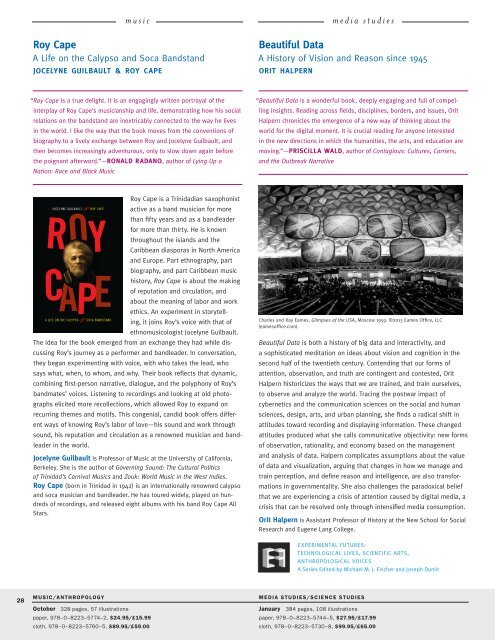x1vuD
x1vuD
x1vuD
You also want an ePaper? Increase the reach of your titles
YUMPU automatically turns print PDFs into web optimized ePapers that Google loves.
music<br />
Roy Cape<br />
A Life on the Calypso and Soca Bandstand<br />
jocelyne guilbault & roy cape<br />
Beautiful Data<br />
A History of Vision and Reason since 1945<br />
orit halpern<br />
media studies<br />
“Roy Cape is a true delight. It is an engagingly written portrayal of the<br />
interplay of Roy Cape’s musicianship and life, demonstrating how his social<br />
relations on the bandstand are inextricably connected to the way he lives<br />
in the world. I like the way that the book moves from the conventions of<br />
biography to a lively exchange between Roy and Jocelyne Guilbault, and<br />
then becomes increasingly adventurous, only to slow down again before<br />
the poignant afterword.”—RONALD RADANO, author of Lying Up a<br />
Nation: Race and Black Music<br />
“Beautiful Data is a wonderful book, deeply engaging and full of compelling<br />
insights. Reading across fields, disciplines, borders, and issues, Orit<br />
Halpern chronicles the emergence of a new way of thinking about the<br />
world for the digital moment. It is crucial reading for anyone interested<br />
in the new directions in which the humanities, the arts, and education are<br />
moving.”—PRISCILLA WALD, author of Contagious: Cultures, Carriers,<br />
and the Outbreak Narrative<br />
joCeLyne guiLBAuLt<br />
A Life on the CALypso<br />
roy CApe<br />
soCA BAndstAnd<br />
Roy Cape is a Trinidadian saxophonist<br />
active as a band musician for more<br />
than fifty years and as a bandleader<br />
for more than thirty. He is known<br />
throughout the islands and the<br />
Caribbean diasporas in North America<br />
and Europe. Part ethnography, part<br />
biography, and part Caribbean music<br />
history, Roy Cape is about the making<br />
of reputation and circulation, and<br />
about the meaning of labor and work<br />
ethics. An experiment in storytelling,<br />
it joins Roy’s voice with that of<br />
ethnomusicologist Jocelyne Guilbault.<br />
The idea for the book emerged from an exchange they had while discussing<br />
Roy’s journey as a performer and bandleader. In conversation,<br />
they began experimenting with voice, with who takes the lead, who<br />
says what, when, to whom, and why. Their book reflects that dynamic,<br />
combining first-person narrative, dialogue, and the polyphony of Roy’s<br />
bandmates’ voices. Listening to recordings and looking at old photographs<br />
elicited more recollections, which allowed Roy to expand on<br />
recurring themes and motifs. This congenial, candid book offers different<br />
ways of knowing Roy’s labor of love—his sound and work through<br />
sound, his reputation and circulation as a renowned musician and bandleader<br />
in the world.<br />
Jocelyne Guilbault is Professor of Music at the University of California,<br />
Berkeley. She is the author of Governing Sound: The Cultural Politics<br />
of Trinidad’s Carnival Musics and Zouk: World Music in the West Indies.<br />
Roy Cape (born in Trinidad in 1942) is an internationally renowned calypso<br />
and soca musician and bandleader. He has toured widely, played on hundreds<br />
of recordings, and released eight albums with his band Roy Cape All<br />
Stars.<br />
Charles and Ray Eames, Glimpses of the USA, Moscow 1959. ©2013 Eames Office, LLC<br />
(eamesoffice.com).<br />
Beautiful Data is both a history of big data and interactivity, and<br />
a sophisticated meditation on ideas about vision and cognition in the<br />
second half of the twentieth century. Contending that our forms of<br />
attention, observation, and truth are contingent and contested, Orit<br />
Halpern historicizes the ways that we are trained, and train ourselves,<br />
to observe and analyze the world. Tracing the postwar impact of<br />
cybernetics and the communication sciences on the social and human<br />
sciences, design, arts, and urban planning, she finds a radical shift in<br />
attitudes toward recording and displaying information. These changed<br />
attitudes produced what she calls communicative objectivity: new forms<br />
of observation, rationality, and economy based on the management<br />
and analysis of data. Halpern complicates assumptions about the value<br />
of data and visualization, arguing that changes in how we manage and<br />
train perception, and define reason and intelligence, are also transformations<br />
in governmentality. She also challenges the paradoxical belief<br />
that we are experiencing a crisis of attention caused by digital media, a<br />
crisis that can be resolved only through intensified media consumption.<br />
Orit Halpern is Assistant Professor of History at the New School for Social<br />
Research and Eugene Lang College.<br />
EXPERIMENTAL FUTURES:<br />
TECHNOLOGICAL LIVES, SCIENTIFIC ARTS,<br />
ANTHROPOLOGICAL VOICES<br />
A Series Edited by Michael M. J. Fischer and Joseph Dumit<br />
28<br />
MUSIC/ANTHROPOLOGY<br />
October 328 pages, 57 illustrations<br />
paper, 978–0–8223–5774–2, $24.95/£15.99<br />
cloth, 978–0–8223–5760–5, $89.95/£59.00<br />
MEDIA STUDIES/SCIENCE STUDIES<br />
January 384 pages, 108 illustrations<br />
paper, 978–0–8223–5744–5, $27.95/£17.99<br />
cloth, 978–0–8223–5730–8, $99.95/£65.00


